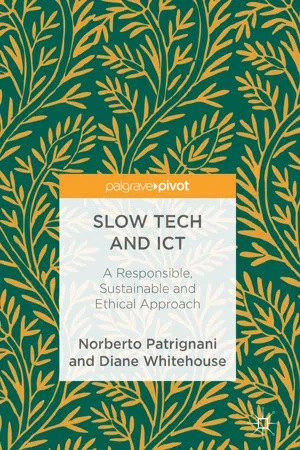Conversations need time
. Since we first discussed many of the challenges apparent in this book, we have—by meeting three or four times
a year and working together at a distance—formulated a new way of thinking about information and communication technology (ICT) that we call Slow Tech.
This book fits well with many of the slow approaches which have been in development for a quarter of a century in various fields. Together, and with colleagues, we have drawn principally on parallels with the Slow
Food movement (Petrini 2011) to develop this new approach to ICT: an approach that emphasises the importance of responsibility, sustainability
, and ethics.
The Slow Food
movement was launched in Northern Italy in the mid-01980s and has been spreading steadily internationally ever since. It has led to a more profound understanding of food, crops, and agriculture. According to Slow Food
, food must be good (or taste good), clean (be produced following criteria that respect the environment), and fair (so as to ensure the rights of farmers
). The slow concept has been adopted in many other fields too—in art, fashion, families, the home, medicine (see www.slowmedicine.it), and journalism (see www.slow-journalism.com).
The term Slow Tech has emerged in at least three other areas related to technology: a form of ICT typified by a concern for reflection, mental rest, and mindfulness
(Hallnäs and Redström 2001), a description of the cultural and social impacts of mobile ICT devices (Kopomaa 2007), and an investigation of problems related to the lack of resilience
of modern-day products (Price 2009).
We have our own way of interpreting the meaning of Slow Tech, chiefly in relation to Slow Food
(Petrini 2011), although we have also drawn on the influences of a number of other technology-related thinkers and activists (see Chap. 2 on pneumatophores
). Our starting point is that slow ideas can certainly be transferred to ICT.
Slow Tech provides people with ‘the brakes required in the technological Indianapolis’
(Patrignani and Whitehouse 2013: 389). It offers people more time
for reflection and for the processes needed to design and use ICT that takes into account human
well-being (good ICT
), the whole life
cycle
of the materials, energy
, and products used to create, manufacture, power
, and dispose of ICT (clean ICT
), and the working conditions of workers
throughout the entire
ICT supply chain (fair ICT
).
As a result of this thinking, we propose that Slow Tech can act as a compass
to help people to understand the directions needed for a new roadmap
for computing. A Slow Tech movement could enable human beings to concentrate on aspects of their lives that are more important and meaningful than simple speed
and efficiency. Hence, we encourage our book’s readers to work collaboratively on finding new directions for ICT. This growing cooperation could mean the start of activities that affect positively and constructively people’s individual, social, and corporate lives.
There are some signs that such a movement is starting already. In their home life, people are growing their own fruits and vegetables, recycling, knitting, and sewing: they are also turning off their machines and are instead reading books, writing letters, drawing, and starting conversations. In the commercial world, the demand for a new relationship between technology and society is also being recognised (Maketechhuman 2015).
* * *
This book acts step-by-step as a gentle, general introduction to the notion of Slow Tech in terms of ICT: an ICT that is good
(human-centred
), clean
(environmentally
sustainable), and fair
(meaning that it respects the human
rights of all the workers
involved along the entire ICT
value chain).
The chapters reflect the book’s title with its focus on a responsible, sustainable, and ethical approach to ICT. Each chapter contains its own abstract and keywords.
The book should be read as an encouragement to move in a Slow Tech direction and to search out concrete ways and means of acting in a Slow Tech way on a day-to-day basis. It is intended that the volume offers plenty of examples and illustrations of people, companies, initiatives, and movements that can help to provide inspiration for this new way of thinking and behaving about ICT, and ensuring responsibility, sustainability
, and ethics.
References
Hallnäs, L., & Redström, J. (2001). Slow Technology; Designing for Reflection. Journal of Personal and Ubiquitous Computing, 5(3), 201–210.Crossref
Kopomaa, T. (2007). Affected by the Mobiles: Mobile Phone Culture, Text Messaging, and Digital Welfare Services. In R. Pertierra (Ed.), The Social Construction and Usage of Communication Technologies: Asian and European Experiences (pp. 48–59). Quezon City: University of the Philippines Press.
Maketechhuman. (2015). http://www.wired.com/category/maketechhuman. Accessed [9 October 2017].
Patrignani, N., & Whitehouse, D. (2013). Slow Tech: Towards Good, Clean, and Fair ICT. In T. W. Bynum, W. Fleischman, A. Gerdes, G. M. Nielsen & S. Rogerson (Eds.), The Possibilities of Ethical ICT, Proceedings of ETHICOMP 2013—International Conference on the Social and Ethical Impacts of Information and Communication Technology (pp. 384–390), Print & Sign University of Southern Denmark, Kolding.
Petrini, C. (2011). Buono, Pulito e Giusto. Torino: Einaudi.
Price, A. (2009). Slow-Tech: Manifesto for an Over-Wound World. London: Atlantic Books.
In botanical studies, pneumatophores are—in marshes or bogs—the parts of tree roots that access the air and nurture other parts of trees that otherwi...




